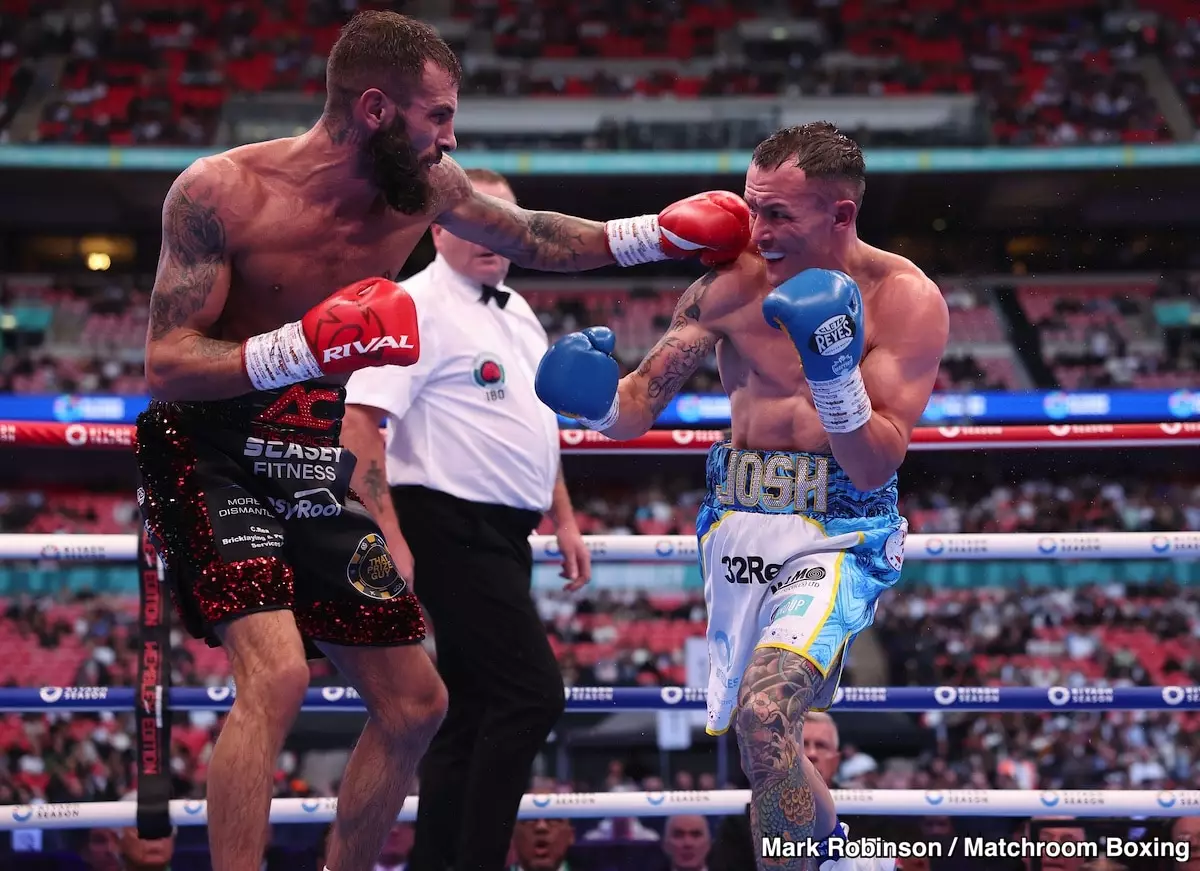After an impressive defense of his IBO super featherweight title against former two-time champion Josh Warrington, Anthony Cacace is contemplating a move to the lightweight division. At 35 years old, the time could not be more critical for the Belfast native, whose record now stands at 23 wins, 1 loss, and 8 knockouts. The prospect of squaring off against the reigning champions in this highly competitive weight class—specifically Vasily Lomachenko and Gervonta ‘Tank’ Davis—provides both a thrilling challenge and a lucrative opportunity.
Cacace’s performance at Wembley Stadium last Saturday night was commendable, as he secured a unanimous decision victory over Warrington with scores of 117-111 across the board. This dominant showing, however, came with some reservations. Cacace’s struggle to establish distance during the match may weigh heavily on his strategy moving forward, particularly if he chooses to elevate his ambitions.
The financial allure of boxing at 135 pounds cannot be overstated. Cacace stands to gain substantially more from bouts with top contenders like Lomachenko and Davis than he would by continuing to defend his title against dangerous opponents such as Eduardo ‘Sugar’ Nunez. While the prospect of facing the hard-hitting Nunez could provide a reasonable payday, it pales in comparison to the riches that await in higher divisions. For a fighter nearing 36, the clock is ticking, and Cacace must make choices that align with both his financial and athletic aspirations.
In the world of boxing, notable matchups often lead to major financial rewards, and Cacace seems keenly aware of this reality. His insight into the differences in potential earnings reflects a growing trend among fighters who are strategically considering their options more than ever before.
The Challenges of Fighting at Lightweight
Transitioning to a heavier weight class brings inherent difficulties. While gaining the opportunity to challenge Lomachenko or Tank Davis symbolizes ambition, these champions are not only skilled but pose a physical threat that Cacace must prepare for adequately. Cacace himself acknowledges that his previous victory over Warrington, while important, did not demonstrate his full capabilities. The smaller fighter managed to close the distance and disrupt Cacace’s rhythm, a scenario that could be exacerbated against more powerful opponents in the lightweight division.
“My corner was frustrated at me not keeping it long,” Cacace remarked, underscoring his struggle to implement a game plan effectively. Fighting taller and more technically proficient boxers exposes the vulnerabilities in Cacace’s strategy, forcing him to refine his skills if he hopes to succeed against elite competition. A lackluster performance against a seasoned opponent like Warrington raises questions about Cacace’s readiness for the elite of the lightweight division.
Cacace’s ambitions are clear as he seeks higher-level competition. He boasts confidence, proclaiming himself as a viable contender for champions like Lomachenko and Davis. His determination positions him uniquely; he notes that with a move up, he would become the mandatory challenger for Lomachenko’s IBF title, an enticing opportunity that could elevate his status in the boxing world.
Nonetheless, Cacace must also navigate the political landscape of boxing management. The prospect of fighting Tank Davis may seem appealing, but previous encounters suggest that Davis’ team is often cautious, prioritizing favorable matchups. If Cacace’s aim to ascend the ranks is to be realized, he will need to demonstrate not only competitive spirit but also strategic insight in securing a fight against high-caliber opponents.
The Road Ahead
As Anthony Cacace stands at a crossroads in his boxing career, the decision to transition to lightweight is fraught with both opportunities and challenges. While the financial implications make moving up a tempting prospect, the reality of facing more powerful and skilled contenders cannot be ignored. For Cacace, every fight from this point forward becomes critical—not just in terms of wins and losses, but in establishing a legacy worthy of his aspirations.
He will need to adapt, refine his strategies, and approach his training with renewed vigor to rise to the occasion against tougher competition in the lightweight category. The journey may be just beginning, but with his latest victory and newfound determination, Cacace seems ready to tackle whatever awaits on the horizon.

